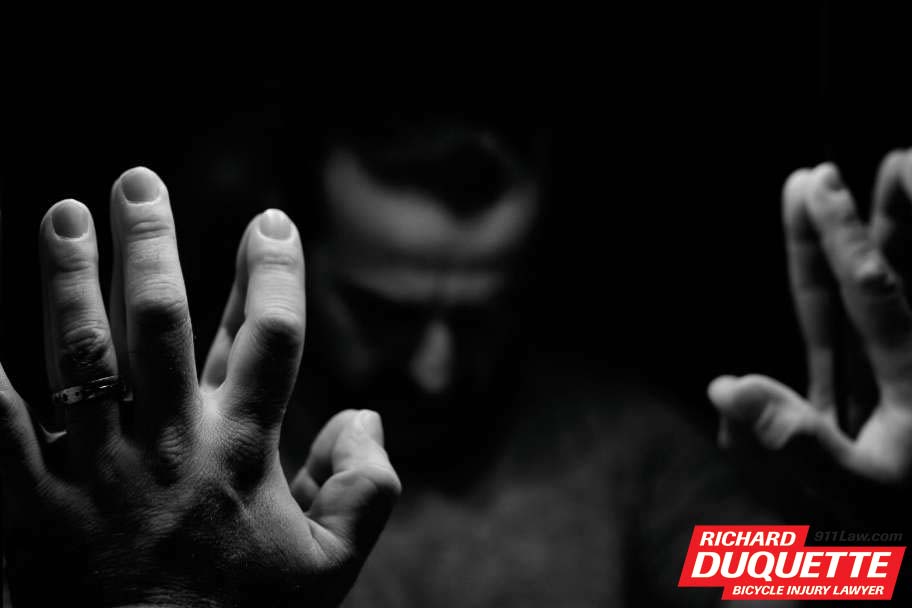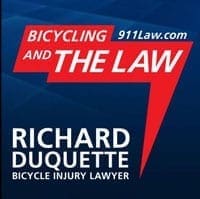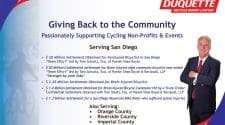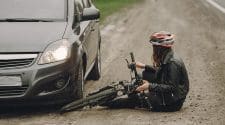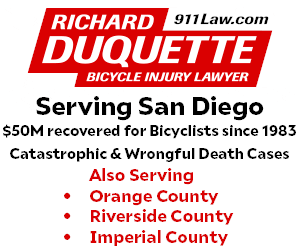By Richard Duquette, Esq, Law Firm of Richard Duquette
Listen to Podcast
In bicycle vs. auto collisions, the bicyclist is almost always the party who is more likely to be injured. This is just the nature of things when a human body collides with thousands of pounds of steel at high speeds. For the same reason, sometimes bicyclists tragically lose their life as a result of these collisions. This three-part article addresses the question of what legal remedies exist for the surviving family of a bicyclist who is killed by a negligent driver. Part one of this article discusses proving fault, and the distinction between wrongful death claims and a survival action. Part two discusses the classes of plaintiffs who may bring a wrongful death action. Part three explains the types of damages that are available to them.
Proving Fault
In a typical bicycle injury case, proving fault involves compiling all of the evidence, including witness statements, party statements, police reports, and analyzing the facts using the Vehicle Code, reconstructionists, bicycle safety experts, and the principles of reasonableness. Insurance companies will often try to nitpick and shift blame to the injured victim. Even when they concede that the driver was primarily at fault, they will try to say that the cyclist could have done something differently. This is a tactic used to avoid paying full damages, based on a legal principle known as “comparative fault,” which holds that an injured plaintiff may only recover to the degree they were not at fault. When the victim is still alive to tell their story, it’s a lot easier for a skilled attorney to fight frivolous allegations of comparative fault.
However, when the victim is dead, it is harder to tell their story. The responding police cannot question them for their version of the facts. And the driver of the vehicle is very likely to present the facts in a way that makes them seem less culpable. Further, there are not always objective eye witnesses to be found in these cases. So oftentimes, proving fault in a wrongful death case will require extensive investigation. Sometimes it requires the police to go beyond mere reconstruction to actual reenactment of the scenario. These extensive investigations are done because of the potential for criminal charges, but they can also assist a plaintiff’s attorney in making the case for liability. Police work in these cases takes time.
Survival Actions Distinguished from Wrongful Death
When a person suffers an untimely death, there are two distinct actions that may be brought. It is important to distinguish between these two claims. The “survival action,” in which the estate of the decedent is the nominal plaintiff, focuses on damages the decedent incurred prior to death. These would include any medical expenses or property damages, and any other claims that the decedent would have against the defendant if they had lived. Unlike some states, California does not allow for pre-death pain and suffering damages in this cause of action (See Code of Civil Procedure §377.34). The damages available in these cases therefore include:
- Medical Expenses
- Funeral Expenses
- Property Damages
- Punitive Damages
Because of the lack of forward looking economic damages and the lack of pain and suffering, survival actions generally produce lower recoveries than wrongful death claims. However, a good attorney understands that in any case, both causes of action could be brought. Further, there is some overlap between these damages and the direct pecuniary loss damages available to wrongful death claimants. The specifics of the case will determine whether to claim them as part of the survival action damages or the wrongful death damages. For instance, if the surviving spouse pays medical or funeral expenses out of pocket, these should be awarded as part of the wrongful death claim paid directly to the spouse. However, if these payments are deferred as debt held against the estate, they should be claimed in the survival action.
Because survival actions focus on the decedent’s damages, all money collected in a survival action settlement or judgment will be distributed through the estate to all legal beneficiaries through the probate process (after discharging of all debts). This means that the class of persons who may benefit from a survival action (i.e. “real parties in interest”) may be different from those who may benefit from wrongful death, depending on whether there is a will and the way the estate is structured. For this reason, it is important for an attorney taking on a case such as this to determine whether there is a will, and sometimes they will need to consult with a probate attorney to identify the potential beneficiaries to put them on notice of the action. These beneficiaries are not direct participants in the survival action claim, but because they have an interest in it, they should be notified. This would include any charitable foundations or non-relatives named in the will, or, if there is not a will, any relatives who would be eligible to inherit under the intestacy statute, even if they do not qualify as a claimant for wrongful death purposes. This issue is especially important if the decedent was a resident of another state, where intestate succession rules may differ from those in California.
An additional question raised when there is no will is who is the personal representative of the estate for purposes of bringing a claim? Generally where a will exists, it will name a representative. But if there is no will, naming a representative is a question of law. Generally it will be the surviving spouse. But if there is no surviving spouse, it may be an adult child. In the probate context, the courts will often have to name a personal representative to administer the estate. This sometimes means appointing a non-family member, if no family member is able and willing to serve in this role. We address this and other questions in more detail in the next installment, which focuses on who may bring a wrongful death claim.
Read Part 2 – Bicycles and Wrongful Death: Part 2 Who may Claim Damages?
Read Part 3 – Bicycles and Wrongful Death: Part 3 Damages
Enjoy More Articles and Podcasts By Richard Duquette, Esq, Law Firm of Richard Duquette
About the Law Firm of Richard L. Duquette
The Law Firm of Richard Duquette has recovered millions in damages for injured bicyclists since 1983. Attorney Duquette is an experienced bicyclist himself and has dedicated his practice to helping this community. He is experienced in all types of cases involving bicycle crashes, injuries, and other legal troubles.
Mr. Duquette serves a wide variety of bicyclists. Whether you prefer road cycling, mountain biking, track riding, Randonneuring, E-Bicycles, Handcycles, Century Rides, Triathlons, Duathlons, or Criterium, Mr. Duquette knows how to best serve your legal needs regardless of the type of bicyclist you are.
Mr. Duquette is an expert at maximizing, proving, and recovering damages.
For more information please visit the Law Firm of Richard Duquette.
The information in this article is for general information purposes only. The focus of this article is on California Law. You should contact an attorney in your state for case-specific advice, as details of the law and procedural requirements vary from state to state. Nothing in this article should be taken as legal advice for any individual case or situation. This information is not intended to create an attorney-client relationship; and the receipt, reading, listening, or viewing of this content shall not constitute an attorney-client relationship. Nothing in this article shall be construed as a warrant, promise, or guarantee about the outcome of your case or any other matter. This information may contain personal impressions or statements of opinion on a subject that do not apply in your case. Further, statements of law reflect the current state of the law at the time of writing and/or recording, and may not reflect subsequent changes in the law.
No products found.


